9 romance scams, and dating scammers’ favorite lies
Advances in AI can make romance scams harder to spot. But despite the new tech, many scammers still rely on the same old strategies. Learn about common dating scam tactics and fraudsters’ favorite lies. And use Norton 360 Deluxe with its built-in scam-detection technology to help spot romance scams before you fall victim.

Key takeaways
- Romance scams cost U.S. victims over $1 billion in 2024.
- Scammers often avoid video and in-person contact, invent emergencies, and use tactics like love bombing and gaslighting.
- Never send money or personal information to someone you’ve met online without first verifying their identity.
Romance scammers manipulate their targets’ emotions to obtain money and personal information. Thanks in part to AI, their tactics are becoming more advanced, costing U.S. victims over $1 billion in 2024, with the median financial loss standing at $2,000.
One flagrant example is the case of Aurora Phelps, a Las Vegas woman who allegedly targeted nearly a dozen older men. She reportedly found her victims on dating apps, gained their trust, and lured them to Mexico. Upon meeting, she drugged them and stole their financial assets and personal belongings.
To help avoid romance scams like these, follow along to learn more about common ruses and ways to protect yourself.
What is a romance scam?
A romance scam, also known as a sweetheart or online dating scam, happens when a scammer creates a fake online identity or simply lies about their intentions to build a relationship. After gaining their target’s trust and affection, the scammer may request money or trick them into revealing sensitive information.
Romance scams often start on dating platforms like Tinder, Hinge, Grindr, or OKCupid, but scammers may also send victims messages “out of the blue” on social media or even via SMS. Scammers often try to move the conversation to lightly moderated messaging platforms like WhatsApp or Telegram.
9 types of romance scams and common lies
Romance scammers often shower their targets with attention, but use excuses to avoid meeting in person — like they’re working overseas or in the military. Then, they claim to need money for emergencies, travel, or medical bills. These ruses allow them to steal money and information from you without engaging in a real relationship.
Here’s a rundown of some common sweetheart scams and examples of lies scammers use to manipulate their victims’ emotions.
1. Military romance scams
Military romance scammers often impersonate U.S. service members, claiming to be stationed overseas in conflict zones or remote locations. Being in the military is romance scammers’ number one pretext to cover suspicious behavior, like being unable to access money or connect via video chat.
Some scammers prey on the belief that military personnel are looking to marry quickly — often due to upcoming deployments or perceived benefits. Others exploit their victims’ sense of patriotism to build trust. They typically avoid video calls, claiming strict military security or poor internet connections as excuses.
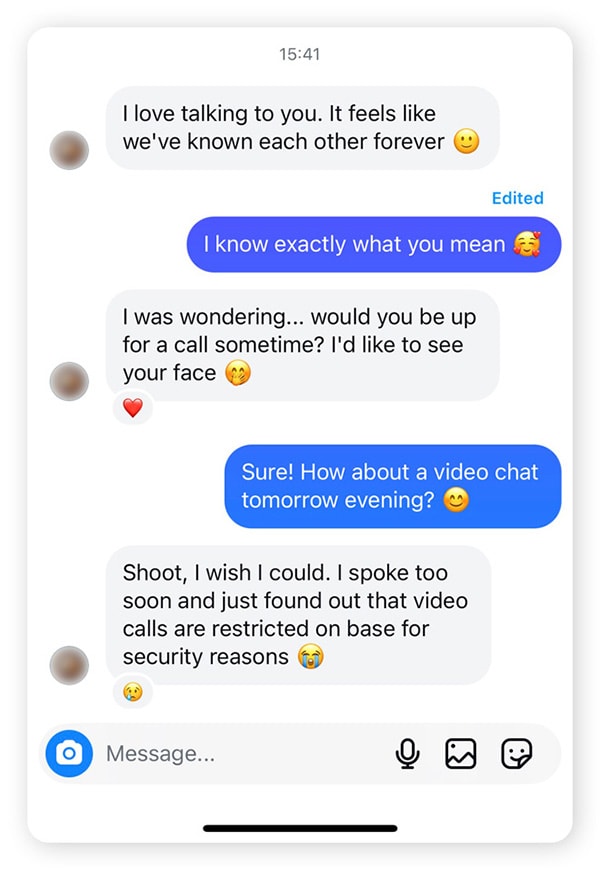

Common lies in a military romance scam:
- “I wish we could meet, but I’m on deployment.”
- “We can’t video call because the internet connection here is terrible.”
- “I can’t access my bank accounts overseas — can you send gift cards?”
- “I'll be coming home soon. Can you send money to help cover my travel expenses?”
2. Nigerian romance scams
Nigerian romance scammers often assume the identity of a Nigerian national, sometimes even claiming to be royalty or high-ranking officials. They craft elaborate stories of financial hardship, unexpected emergencies, or bureaucratic red tape, manipulating victims into sending money under the guise of assistance.
Alternatively, some pose as wealthy individuals looking for love, offering lavish gifts or financial opportunities, but requiring personal details — such as banking information or identification — to facilitate the transfer.
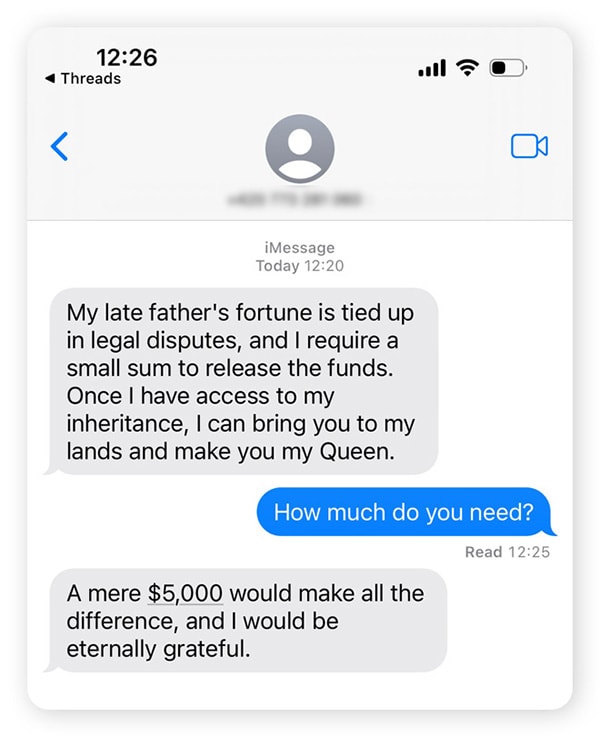

Common lies that Nigerian romance scammers use:
- “I inherited a large sum of money, but I need $2,000 to access it so I can come see you.”
- “The bank froze my accounts, so I can’t afford to visit.”
- “I want to send you a priceless heirloom. Can you send me your address and $500 to cover shipping and customs fees?”
3. Crypto romance scams
A crypto romance scam is a type of online fraud where scammers feign romantic interest and manipulate victims into investing in fake cryptocurrency schemes. Scammers may claim to know about exclusive, high-return opportunities “just for you,” often accelerating the relationship and investment pitches to capitalize on early trust and excitement.
They may also ask you to transfer crypto to them in an emergency, solve cash flow problems, or cover fees for a surprise.


Common lies in a crypto romance scam:
- “I've made a huge profit with this crypto trading strategy, and I want to share it with you.”
- “I know we just met, but I feel a real connection. I've been making amazing returns on a new crypto launch, and I’d love to share this opportunity with you. It feels like a sign.”
- “I had a small accident while trying to set up a nice surprise for our next date, and now I’m short on funds. Could you help me with a small crypto transaction?”
4. Pig butchering romance scams
Pig butchering schemes, a type of cryptocurrency romance scam, involve building a deep emotional connection over time to “fatten up the pig for slaughter.” Once they build trust, scammers convince their victims to invest in fraudulent cryptocurrency scams. They may manipulate their targets by claiming the investment is necessary to build a future together.
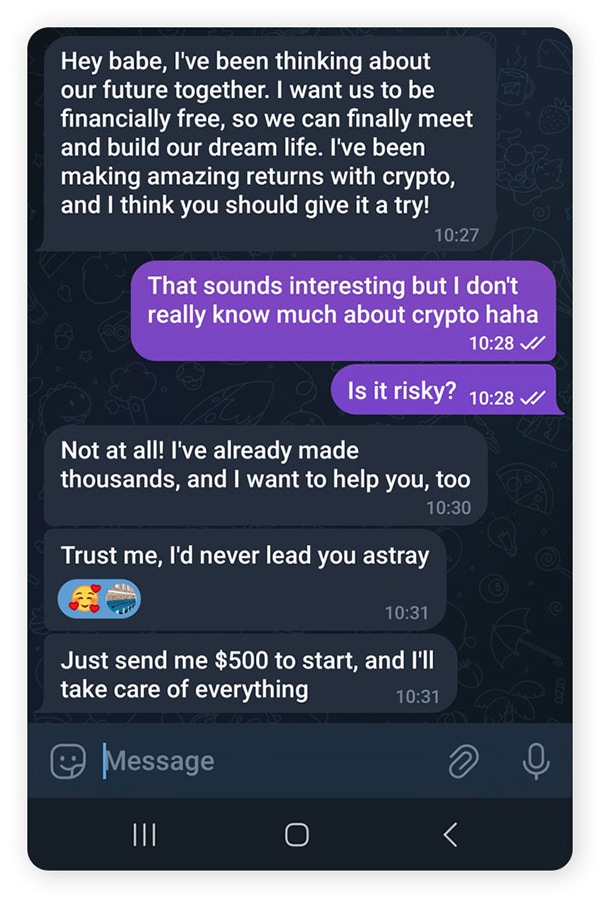

Common lies in a pig butchering scam:
- “My friend is a financial genius — this is a surefire way for us to get money to pay off our debts and get married.”
- “Imagine the life we’ll have together after this crypto takes off.”
- “Let’s invest in this exclusive crypto that’s about to explode, so we can finally move in together.”
5. Facebook romance scams
Usually, a Facebook romance scammer creates a fake profile (or takes over someone else’s profile) and catfishes their target. They might try to hook you by creating the “perfect” profile, loading it with attractive photos and relatable interests and posts.
Once the scammer has your attention, they try to form a relationship by sharing intimate details, preying on your insecurities or loneliness, and making promises about the future — all while subtly laying the groundwork for eventual financial requests.
While nurturing the fake relationship, they might also subtly gather sensitive information by asking seemingly innocent questions about your personal life, finances, and family — information they can use to steal your identity later.
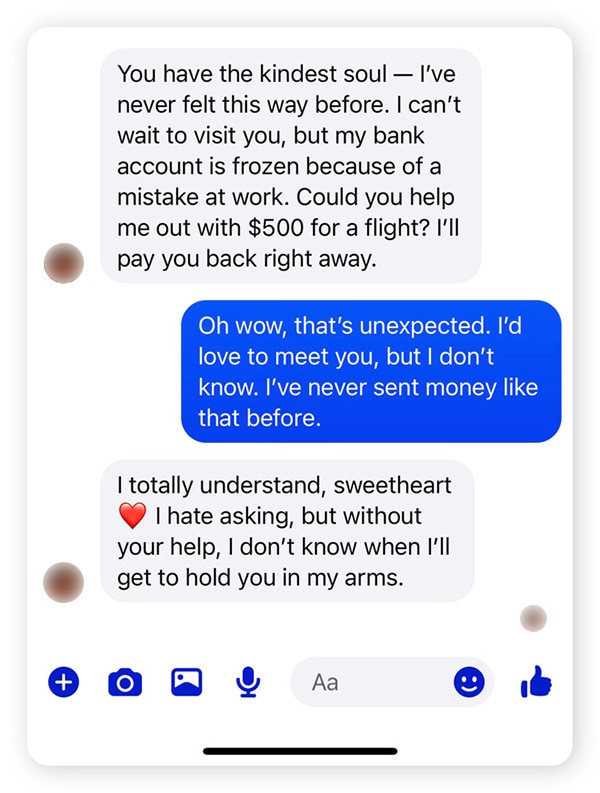

Common lies in a Facebook romance scam:
- “I want to send you a special gift, but the shipping company requires a customs fee before they can deliver it. Can you send the money, and I’ll reimburse you?”
- “My sister is sick, and I need money for a procedure — can you chip in?”
- “I need to verify your identity to prove to my family that you are real. Please send me a photo of your driver’s license.”
- “I want to send you flowers, but the online florist needs your credit card details for verification. It’s just a security measure, and they won't charge anything.”
6. Oil rig romance scams
Oil rig romance scammers typically create fake dating and social media profiles where they claim to work on an offshore oil rig. Then, they use their job’s location and connectivity limitations as an excuse for why they can’t meet in person or on a video call. After some time, they may request money to cover a medical emergency or equipment repairs.
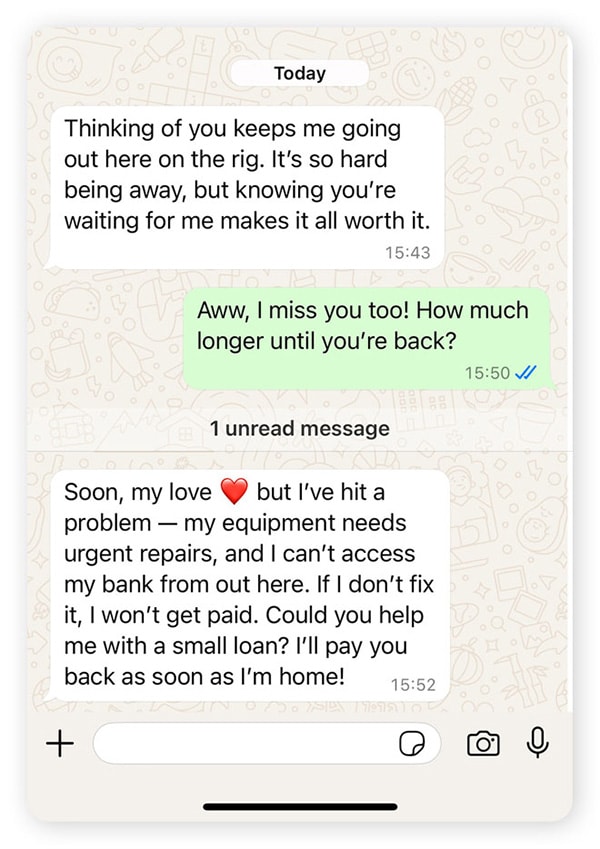

Common lies in an oil rig romance scam:
- “I can’t video chat because we have a bad connection on the rig.”
- “I wish we could meet, but I’ll be on the rig for another six months.”
- “There was an accident on the rig, and I need to pay for medical care, but the company won't release my funds until I return onshore.”
- “I need to pay a penalty fee to take an early retirement, and then we could be together.”
7. Telegram romance scams
Many scams that start on another platform, like Tinder or Facebook, end up on Telegram. Attackers convince their targets to move the conversation to secure messaging apps like Telegram because there’s more anonymity, end-to-end encryption, and little moderation, making it harder to report fraud or recover lost funds.
Some of Telegram’s features, like the built-in cryptocurrency wallet, are particularly convenient for fraudsters running a pig-butchering or crypto scam.
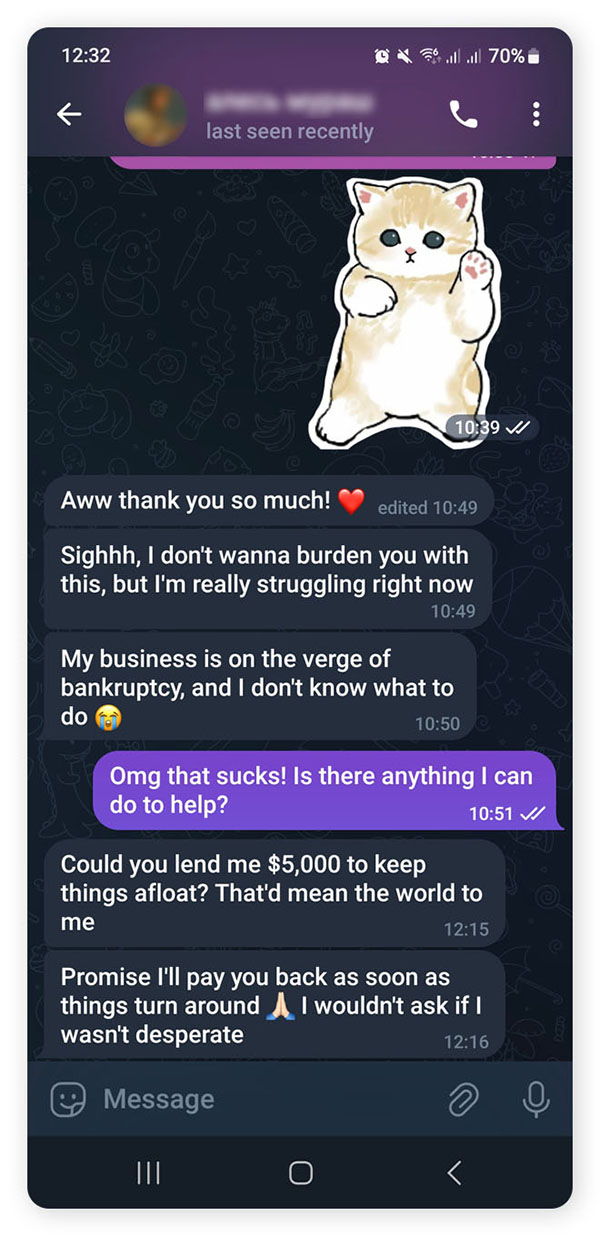

Common lies in a Telegram romance scam:
- “I came across a foolproof investment strategy — it’s going to make us both rich.”
- “My mom fell and broke her hip, and I can’t afford the surgery on my own.”
- “My business is going to go bankrupt if I don’t come up with $5,000 by this week. Can you help?”
8. Celebrity romance scams
Celebrity romance scammers impersonate famous figures to impress and connect with targets. In the past, scammers have claimed to be celebrities like Keanu Reeves and Brad Pitt, even going so far as to create deepfakes and photoshopped images to “prove” their identities. To maintain control, they also tend to pressure victims into secrecy, citing concerns about paparazzi, obsessive fans, or strict NDAs.
After convincing their target, they may leverage flattery, false intimacy, or a fabricated crisis to convince fans to send money.
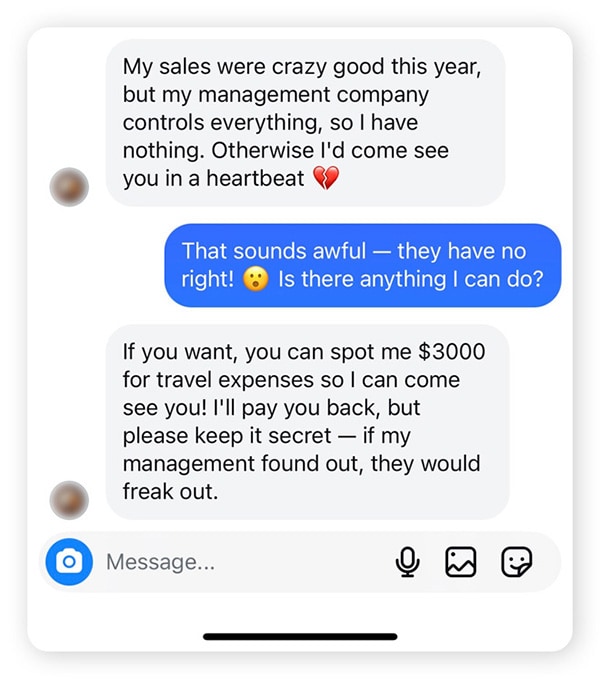

Common lies in a celebrity romance scam:
- “It’s been great getting to know you. I’d love to send you a gift if you could just send $2,000 to cover the tariffs.”
- “My label is controlling my finances, and I need a small loan to handle a personal emergency they can't know about.”
- “My divorce is draining my resources. Can you wire me some money to cover my legal costs?”
- “The paparazzi are harassing me, and I don’t want to expose you to that. That’s why we can’t video chat or meet in public.”
- “I signed an NDA for my next film, so I can’t reveal my location or video chat.”
9. Elderly romance scams
Elderly romance scams exploit older adults’ potential loneliness, desire for companionship, and limited familiarity with technology. Scammers target them not only for their trusting nature, but also for their valuable assets. They often establish a connection by relating to personal struggles, such as the loss of a spouse, strained family relationships, or shared hobbies, before defrauding them.
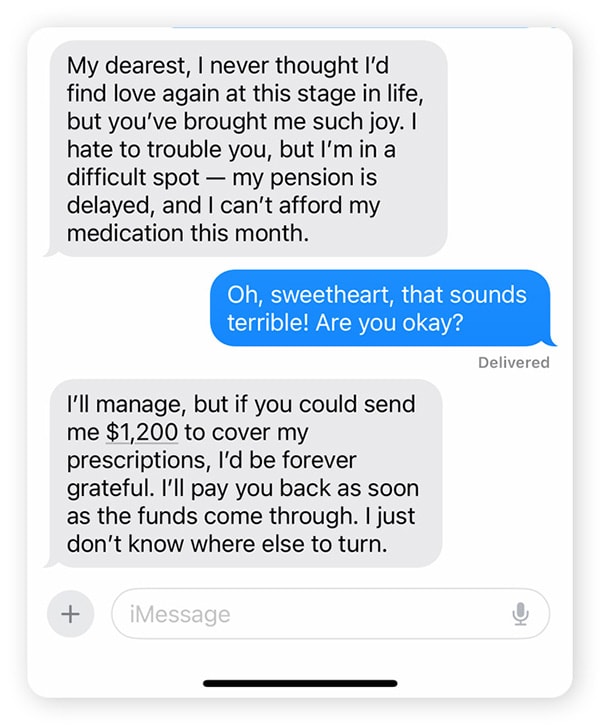

Common lies in an elderly romance scam:
- “My partner passed away recently, and I’m very lonely.”
- “I’ve had a falling out with my children, and I have no one else to turn to.”
- “I’ve had an unexpected medical emergency, and my insurance won’t cover it. Could you please help me with a small loan?”
- “Before we get married, I need to know more about your financial situation, like your bank account details and Social Security number.”
What is the U.S. government doing about romance scams?
In early 2025, the U.S. Congress introduced a new bipartisan bill, the Romance Scam Prevention Act, which would alert users of online dating services if they’ve been exposed to a possible scammer.
If passed, dating apps will have to tell you if you’ve messaged someone who has been banned for potentially fraudulent activity. Within 24 hours of detecting the potential scammer, they’ll need to give you the scammer’s username, info about when you chatted, and scam awareness resources to help you stay safer.
How and why romance scams work
Romance scams are effective because scammers play on their targets’ personality traits and insecurities. Researchers have found that people who are sensation-seeking, impulsive, and addiction-prone are more likely to become romance victims. Likewise, middle-aged people are much more likely to fall for romance scams than young or elderly people — as are well-educated individuals.
Sweetheart scams are long cons, and scammers may tweak their approach based on how they perceive you. They may resort to emotional manipulation tactics like love bombing, guilt-tripping, shaming, isolation, gaslighting, and extreme jealousy to maintain control.
For example, if you’re:
- Lonely, they might message you frequently, showering you with attention and affection.
- Insecure, they might lavish you with compliments and reassurance or prey on your doubts.
- Trusting, they might share more embellished stories and ask for money and information earlier.
- Good-hearted, they might fabricate sob stories or emergencies to exploit your empathy.
- Impulsive, they might bait you with limited-time opportunities or love-bomb you to make the relationship progress quicker.
- Thrill-seeking, they might propose risky ventures, make exciting promises, and create a whirlwind relationship dynamic.
- Co-dependent, they might isolate you from friends and family, making themselves your sole source of support.
Online dating scam statistics and trends
To help you understand larger trends, we’ve compiled insights and analyses from the FTC and a Gen 2024 Threat Report.
Here are some romance scam statistics you should know:
- Dating scams increased toward the end of 2024; the most notable surges were observed in Thailand, Fiji, Iceland, Slovakia, and Finland. (Gen Digital, November 2024)
- In 2023, the FTC received around 64,000 romance scam reports. (FTC, February 2024)
- Romance scam victims lost a combined $1 billion in 2023. (FTC, February 2024)
- Median losses to romance scams amounted to $2,000, making it the costliest type of imposter scam. (FTC, February 2024)
- In 2022, 34% of romance scam victims made cryptocurrency payments, 27% sent wire transfers, 7% sent gift cards, and 3% transferred funds through an app. (FTC, February 2023)
- The most commonly reported romance scam lie involves the fraudster requesting money because they, or someone they know, is sick, injured, or incarcerated. (FTC, February 2023)
- In the first six months of 2023, half of those who reported financial losses due to online romance scams indicated the fraud started on Facebook, Instagram, or Snapchat. (FTC, October 2023)
How to avoid romance scams
You can help avoid romance scams by doing your due diligence to confirm your love interest’s identity and treating quickly progressing relationships with skepticism. Also, refuse to send money, sensitive information, or compromising photos. And if you’re unsure of someone’s intentions, run their messages by a friend or through a scam detector to get an objective perspective.
Here’s a more dialed-in look at how to avoid love scams:
- Do a reverse image search of profile pictures: A reverse image search allows you to upload an image and see where else it appears online. Do this to ensure the person you’re speaking with didn’t steal the photos on their profile.
- Look up the person you’re talking to: Run a casual online background check to catch inconsistencies in a potential scammer’s stories or profile. When doing this, try to confirm their age, location, job, education, and anything else they’ve told you.
- Insist on a video call: Video chats are almost impossible to fake, so ask the person you’re talking to for a cam-on discussion to determine if they’re real.
- Don’t fall for love bombing: Excessive praise and promises early in an online relationship can be a form of emotional manipulation. Nip this in the bud by setting boundaries, pacing the relationship, and not letting your emotions carry you away.
- Avoid sending money before you meet in person: Don’t send money to someone you’ve only met online, as they might not be who they claim to be. They may misuse the funds, and there’s no guarantee they’ll repay you.
- Avoid sending wire transfers or gift cards: Wire transfers and gift cards are unsafe because they’re like sending cash — virtually untraceable and unrecoverable. Similarly, P2P services like Venmo, which are designed for payments between friends and family, can be a convenient way for scammers to take your money and disappear.
- Keep private photos to yourself: Don’t send explicit or embarrassing photos, especially to someone you’ve never met in person. And if you’re dead-set on sending nudes, avoid showing your face and identifiers like tattoos or scars. Otherwise, scammers may use these pictures to blackmail you.
- Ask someone you trust for a gut check: Talking to friends and family provides an outside perspective, as they’re less emotionally invested and can spot red flags you might miss. They can offer objective advice and help you recognize inconsistencies or warning signs in the relationship.
- Run suspicious messages through a scam detector: Using a free scam detector like Norton Genie can help you identify red flags in romantic messages. Genie uses AI technology to analyze language patterns and common scam tactics, then shares a risk assessment.
What if someone I know has fallen for a romance scam?
If you suspect someone you know has fallen under the spell of a romance scammer, approach them with empathy and patience. Avoid accusatory language and gently present your concerns and proof. If they’re emotionally attached, this may be a difficult conversation.
Here are some examples of potential protests and how you can address them to help your friend or family member grasp the seriousness of the situation.
- You’re jealous of what we have: I understand why you feel that way. I know this relationship is important to you, and I don’t want to take away your happiness. But I also don’t want to see you taken advantage of.
- They need my help, I can’t abandon them: I admire your kindness, but real love doesn’t rely on guilt or pressure. If someone truly cares about you, they wouldn’t put you in a position where you feel responsible for their well-being at your own expense.
- I know they love me: I know it feels that way, and I truly hope it's real. But love should come with honesty and trust — have they ever made excuses about why they can’t meet, asked for money, or avoided answering certain questions?
- They promised to pay me back: Promises don’t mean much without follow-through — have they paid back any of the loan?
- They’re a real person: I believe you, and I’m not saying they don’t exist — I just want to make sure they are who they say they are. Have you met them in person or video chatted with them live?
Once they understand, help them take steps to protect themselves, including blocking the scammer, changing passwords, setting up two-factor authentication, and filing fraud alerts.
How to report an online dating scam
If you believe you’ve fallen for a romance scam, immediately stop contact, gather any available evidence, and report the fraud to the platform where it happened, the Federal Trade Commission (FTC), the Federal Bureau of Investigation (FBI), and local police. Read to learn what you can expect from the process.
- Stop communication: Immediately cease all contact with the suspected scammer. Do not respond to any further messages or attempts to reach you.
- Contact your bank: If you’ve sent money, contact your bank, credit card company, or money transfer service immediately. They may be able to stop or reverse the transaction.
- Gather evidence: Collect screenshots of the scammer’s profile, money transfers, and messages.
- File a report with local law enforcement: Consider reporting the scam to your local police department, especially if you’ve suffered a substantial financial loss. They may investigate the crime and potentially recover stolen funds.
- Report the scam to the platform: Notify the online dating site or social media platform where you met the scammer. They can take steps to remove the scammer's profile and prevent them from targeting others.
- Submit a report with the Federal Trade Commission (FTC): File a complaint with the FTC at ReportFraud.ftc.gov so they can track trends.
- Report it to the FBI’s Internet Crime Complaint Center (IC3): If you’re dealing with an online scam, report it at ic3.gov. After receiving your report, the organization may investigate the crime and work with law enforcement to unmask the culprit to identify patterns.
Get protection from romance scammers
It’s tempting to believe romance scams only happen to other people. But they’re alarmingly common, and the consequences go far beyond broken hearts. Victims can lose thousands of dollars and become targets of identity theft.
Norton 360 with LifeLock Select helps protect you from romance scams with an AI-powered Scam Protection suite that includes Deepfake Detection, as well as coverage for lawyers and experts if your identity is stolen as a result of a romance scam. Our U.S.-based restoration specialists are standing by to help you get back on your feet — with up to $25,000 in Stolen Funds Reimbursement if you fall victim to identity theft.*
FAQs
How can you tell if someone is a romance scammer?
The most obvious ways to tell if someone is a scammer include their refusal to video chat or meet in person, urgent requests for money, overly romantic or flattering language, and inconsistencies in their stories or online profiles.
Are romance scams illegal?
Romance scams are illegal when the fraudster extorts you, blackmails you, steals your identity, or tricks you into sending money. But if someone simply catfishes you without causing damages, the offense may fall into a legal gray area, as deception alone isn’t always a prosecutable offense.
How do you outsmart a romance scammer?
To outsmart a romance scammer, start by catching them in lies. You can:
- Prove they aren’t who they say by asking them to video call, meet in person, or send specific images (like a selfie of them putting their ring finger on their nose).
- Look them up online to verify claims about their job, education, relationship history, and interests.
If you determine they’re a romance scammer, you should disengage and report them. While some people opt to waste a scammer’s time, this is risky and could lead to retaliation, putting you at further risk.
How long do romance scams usually last?
Love scams can last from a few weeks to several years. The length of the scam primarily depends on the scammer’s strategy, how quickly they achieve their goals, and whether they believe they can continue to manipulate their victim for further gain.
* Up to $1 million for coverage for Lawyers and Experts, collectively, if needed, for all plans. Reimbursement and expense compensation varies according to plan—up to $1 million for Ultimate Plus, up to $100,000 for Advantage, and up to $25,000 for Standard. Benefits under the Master Policy are issued and covered by third-party insurance companies.
Editorial note: Our articles provide educational information for you. Our offerings may not cover or protect against every type of crime, fraud, or threat we write about. Our goal is to increase awareness about Cyber Safety. Please review complete Terms during enrollment or setup. Remember that no one can prevent all identity theft or cybercrime, and that LifeLock does not monitor all transactions at all businesses. The Norton and LifeLock brands are part of Gen Digital Inc.









Want more?
Follow us for all the latest news, tips, and updates.